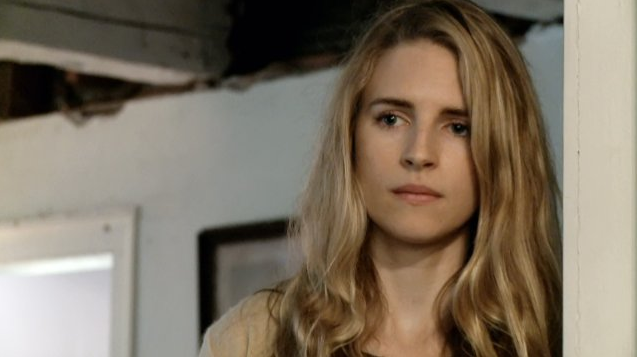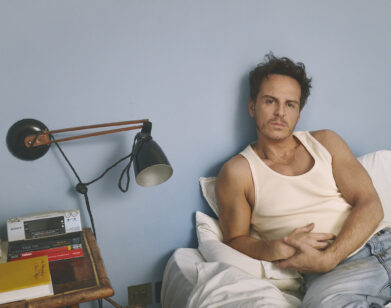The Otherworldly Brit Marling

BRIT MARLING IN ANOTHER EARTH. PHOTO COURTESY OF FOX SEARCHLIGHT
Though her long, blonde hair and piercing blue eyes could rival any Hollywood it-girl’s, “starlet” isn’t quite the right word to describe Brit Marling. There’s a certain vacancy to the starlet—a willingness to be satisfied with spa days and party nights. Marling is the opposite. She is thoughtful and speaks deliberately. She double-majored in economics and studio arts at Georgetown—and then graduated valedictorian. At school, she fell in with two like-minded friends, Mike Cahill and Zal Batmanglij, and the three set out to make movies together, starting with the 2004 US/Cuba conflict documentary Boxers and Ballerinas. Since graduating in 2005, Marling has appeared on Community, booked a role in next year’s Arbitrage, starring Richard Gere and Susan Sarandon, and written, produced, and starred in two films made with Batmanglij and Cahill. Both premiered at Sundance this year, and one—Another Earth—comes out later this month.
Another Earth, a film both ambitious and spare, tells the story of Rhoda (Marling), a promising 17-year-old high school student who’s just been accepted to MIT when she causes a fatal traffic accident. After four years in prison, Rhoda attempts to rediscover her interrupted life—and to build a tenuous relationship with the person she wronged most (her victims’ husband/father, played by William Mapother). Looming in the background—literally—of all this human-scale drama is the revelation, early in the film, that a second, identical Earth exists close to our own; close enough, maybe, to visit. For much of the film, the dramatic and sci-fi storylines twist without intertwining; when they finally do come together, it’s in a truly unexpected way. Marling, whose performance as Rhoda is stunning, took some time last week to talk to Interview about writing, acting, and the penal system.
ALEXANDRIA SYMONDS: Can you talk to me about how Another Earth came about? Was the premise your idea or Mike’s?
BRIT MARLING: The two of us together were batting around this idea and other ideas, initially about doing a feature that was made up of three science-fiction shorts, but all played with the same actress. And they would all be really divergent characters, but they all had these sci-fi epic premises. And then the more we focused on this one, the more we thought, “Oh no, there’s a whole world just in this idea of the two earths, and everyone here being there, and what does that mean, and how can you find a micro-human drama to tell within this epic sort of conceit?”
Then we became obsessed with that and the other two pieces fell away: this is the story, how do we best tell it? And we spent months just trying to crack the story, what happens in the end, what do these things mean? When we came up for the ending of this story, we screamed! I ran circles around him, we were just screaming and chasing each other. We were so excited—because you don’t have a film until you have an ending. A whole film is just about arriving at a moment where you hopefully transfer some feeling to the audience. When we came to that, we thought, “Okay, now we can begin to think of how to make it real along the way.”
SYMONDS: You co-wrote Another Earth, and you also star in it. How do you approach creating a character differently on paper when you know you’re going to be the one playing her?
MARLING: I guess one of the things that you do is you definitely try to push the character in a direction that you’ve never been before. If I feel confident that I can pull off or handle the character, I don’t like that as much as when I feel a little nervous that I may not be able to. There’s something about being a little nervous about doing it that makes you know that you’re pushing yourself into territory that you haven’t been in before. And I think when writing with Mike, we try to think about that. I think he thinks about ways he can push himself as a filmmaker to do really impossible things for very little money.
SYMONDS: You did a lot of really impossible things for very little money!
MARLING: Yeah! How am I going to do this other earth? How am I going to do this car accident? I think I am looking as an actor to find ways to push myself into places I haven’t been before as a human being. I have never been in a catastrophic, cataclysmic accident that changed the course of my life. I have never been in prison. I think all these things become amazing things to daydream on, because you’re getting to have an experience that you wouldn’t otherwise have. I hope as Brit Marling, I’m never arrested and imprisoned. [knocks on wood]
SYMONDS: So you didn’t find yourself sort of fighting the urge to make the Rhoda character flattering for you as an actress?
MARLING: I don’t think I ever even thought about whether she would even be likable or not. I think the one concern I really had was that she not, because of this accident, be sort of wallowing in self-pity. I think that’s a really dangerous place to go as an actor, because it’s a very isolating – any time I’m watching a film, if a character pities themselves, I’m sort of shut down to them emotionally. And so I wanted to make sure that she’s not this weeping willow of a girl, constantly crying and bemoaning her fate. The real challenge is how to create someone who is being active in her grief, and not passive, and attempting to deal with it. I wanted to try to find something almost heroic about her, even though what she has done is horrible and the consequences are devastating—and I don’t know how you recover from that—but I was attempting to find some light in that darkness.
SYMONDS: I think especially in the way the costuming changes throughout the film, you get a really solid sense of the layers coming off, both emotionally and physically.
MARLING: Nobody’s said that before! That’s so true! Because the janitor uniform is so—
SYMONDS: It’s bulky—it’s kind of constricting.
MARLING: And androgynous. And then she becomes more feminine towards the end. Still in sneakers, but…
SYMONDS: Well, you can’t go too far.
MARLING: Yeah, can’t have her in heels, that would be way too obvious.
SYMONDS: [laughs] So we see the car crash, and then there’s four years in prison, which we don’t see—we just see Rhoda coming out and starting her life again. Did you take time to sit down and think about every experience that she might have had in prison?
MARLING: It’s so funny that you say that, because as an actor, you’re responsible for so much that has happened before—you could never go deep enough. I mean, Rhoda has lived for seventeen years before the story starts, and then another four in prison. Even if you have six months to prepare, you cannot even go as deep as you want to. So it’s always just a question of how deep can you go before the first day you start shooting.
I thought a lot about what it would be like to be locked up, and I watched documentaries, and read articles and essays and poetry written by people who have had that experience, who have been imprisoned. And my gosh, the thing that I came to on the other side of all that daydreaming and thinking and feeling it is that it is just the most cruel and unusual and inhumane thing to do to a person. And completely destructive of their humanity. A totally broken system for dealing with crime. There’s no way to go through that and be rehabilitated and improved in any way and then returned to society. It’s completely impossible.
That’s one of the things that’s amazing about acting, it takes you places that you would never… I mean, when am I, Brit Marling, going to sit and daydream for a month about what it means to be locked up? It probably will not happen with that degree of focus. You do that and you arrive at a conclusion that something that’s pretty widely accepted in our society and culture, this is how we deal with crime and this is how we punish people. You spend time thinking about that and you’re like, this really makes absolutely no sense whatsoever. It’s pure torture. To be locked alone in a cell without any human interaction, without sun, you begin to lose whole pieces of your humanity in order to survive that. I thought about a lot of that, and I think that’s why Rhoda and John have such an intense relationship—because they both have gone through that solitary confinement.
SYMONDS: The movie established pretty clearly that Rhoda didn’t have malicious intent; she was just absentminded, and it was very clearly an accident. It was a horrible accident, and it was her fault, and you can’t deny that—but to then be treated exactly the same as someone who shot up a bank is totally insane.
MARLING: It is insane! And I think Mike and I were thinking a lot about how you recover from that experience. She made a mistake, and as a result she will never be the same, her life will never be the same, and how do you transcend that?
SYMONDS: What was life at Georgetown like for you?
MARLING: It was a strange place for the three of us to end up. A lot more people were going to work at banks or on Capitol Hill. But I think because the three of us found each other there, and because what we were doing was kind of unusual, it made it the most amazing place. We found each other and then we just started making this work. There weren’t a lot of people doing it, so we were just kind of teaching ourselves, and we felt this real freedom to do it, because there was not a lot of pressure. We were not doing it in the context of a film school or an art school, where there’s all this competition. We were just doing it for the pure love of it. And I think that’s actually very beautiful, and I’m really very grateful to Georgetown.
ANOTHER EARTH WILL BE RELEASED JULY 22.






